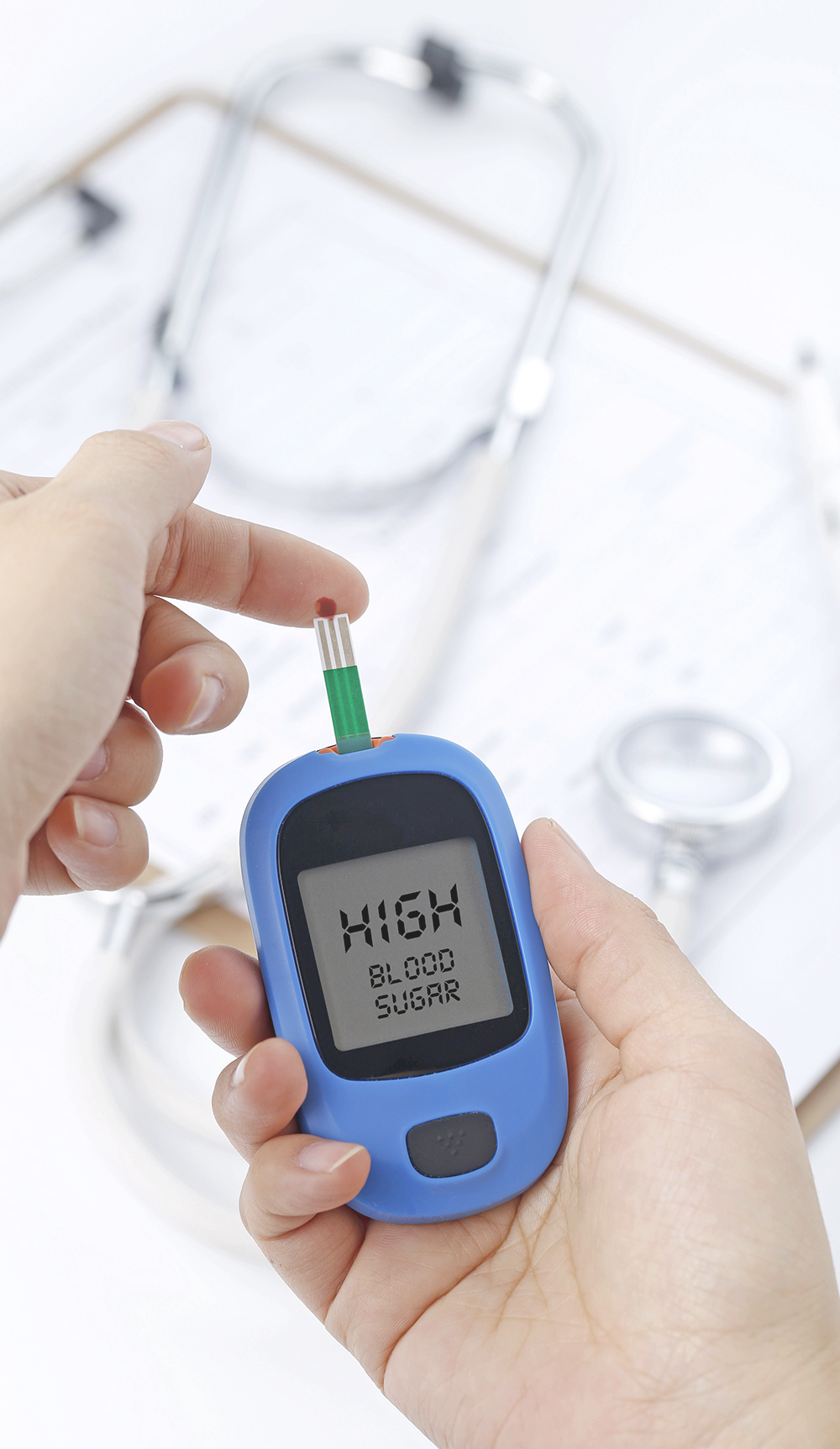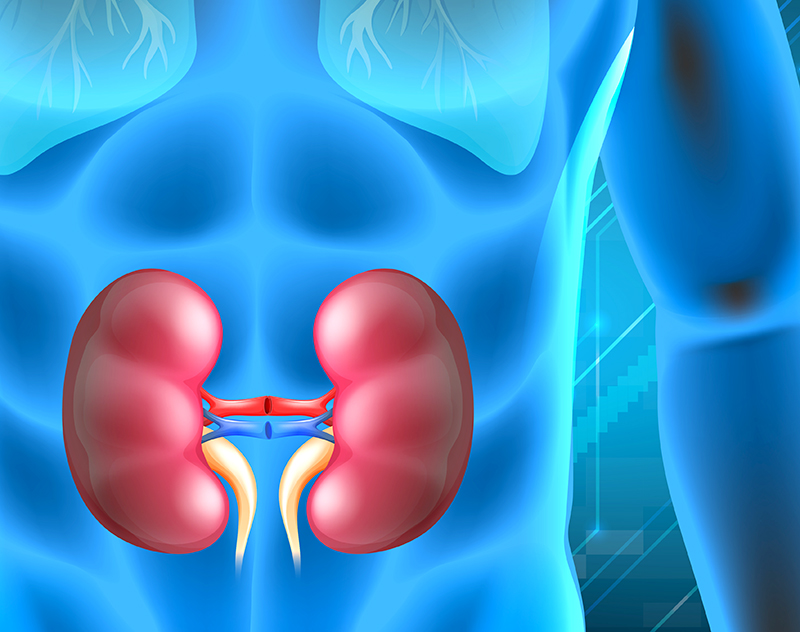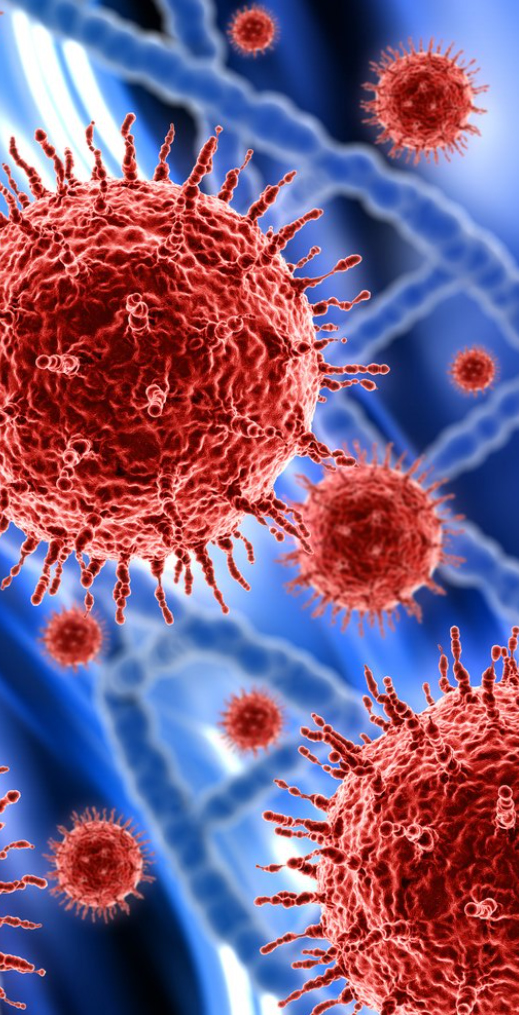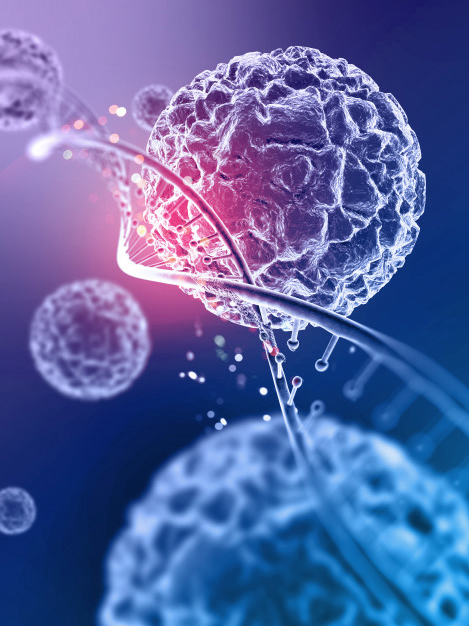
Stem cells, the architects of regeneration &
silent builders of hope within our bodies
WHAT ARE STEM CELLS?
Stem cells are a special type of undifferentiated cell with the remarkable ability to develop into various cell types in the body. They serve as a foundational component of the body’s natural repair and regeneration system.
Stem cell therapy uses cells to replace or repair a patient’s cells or tissues that are damaged or absent. The stem cells or cells derived from them may be from the patient or a donor. The cells may be processed in the laboratory, including multiplying in number or altering genes, before they are put into the patient’s blood or transplanted directly into the damaged tissue. Stem cell treatments may also involve recruiting the stem cells within the patient’s own tissues for self-repair.

WHAT IS STEM CELL THERAPY FOR DIABETES?
Stem cell therapy for diabetes is an area of active research and holds promise for the treatment of this chronic metabolic disorder. Diabetes is characterized by high blood sugar levels resulting from defects in insulin production, insulin action, or both. Stem cell therapy aims to address these issues by regenerating or replacing damaged pancreatic cells responsible for insulin production.
While stem cell therapy for diabetes holds significant potential, it is essential to approach these treatments with caution, recognizing the need for further research, long-term safety assessments, and regulatory approvals. Patients interested in stem cell therapy for diabetes should consult with healthcare professionals and consider participating in well-designed clinical trials.
ALLCELL, Mesenchymal Stem Cells (MSC) Treatments for Diabetes
ALLCELL, 间充质干细胞(MSC)治疗糖尿病
About Diabetes 关于糖尿病
- Diabetes is a chronic, metabolic disease characterized by elevated levels of blood glucose (or blood sugar), which leads over time to serious damage to the heart, blood vessels, eyes, kidneys and nerves.
- The most common is type 2 diabetes, usually in adults, which occurs when the body becomes resistant to insulin or doesn’t make enough insulin.
- Type 1 diabetes, once known as juvenile diabetes or insulin-dependent diabetes, is a chronic condition in which the pancreas produces little or no insulin by itself.
- 糖尿病是一种以血糖水平升高为特征的慢性代谢性疾病。随着时间的推移,将会对心脏、血管、眼睛、肾脏和神经造成严重的损害。
- 最常见的是 2 型糖尿病并通常发生在成年人身上。当身体对胰岛素产生抵抗或胰岛素分泌不足时就会出现这种情况。
- 1 型糖尿病曾被称为幼年型糖尿病或胰岛素依赖型糖尿病,是一种胰脏自身不能分泌胰岛素或胰岛素分泌不足的慢性疾病。
ALLCELL advantages for Diabetes Patients
ALLCELL 为糖尿病患者带来的优势
- Increment of C-peptide levels (Increase Insulin sensitivity).
- Over time reduction of blood glucose/sugar levels (HBA1c levels) and Inflammation.
- Improves blood flow, heart strength to prevent diabetes worsening.
- Common side effects include injection site pain and swelling, resolved within one week. No significant abnormalities observes from hematology, serum chemistry, serology, urine analyses and other evaluation.
- 提高 C – 胜肽水平(增加胰岛素敏感度)。
- 随着时间能降低血糖水平(糖化血红蛋白水平)和炎症。
- 改善血液流动及增强心脏功能,以防止糖尿病恶化。
常见的副作用包括注射部位出现疼痛和肿胀,但是一周内即可缓解。 - 在血液检验、血清化学、尿液分析和其他评估中不会发现明显异常。
WHAT IS STEM CELL for cardiovascular disease?
Stem cell therapy for cardiovascular disease involves the use of stem cells to repair damaged heart tissue, promote angiogenesis (formation of new blood vessels), and improve overall cardiac function. Cardiovascular diseases, including conditions such as myocardial infarction (heart attack) and heart failure, can lead to irreversible damage to the heart muscle. Stem cell therapy aims to address these issues and has been the focus of extensive research.
Stem cell therapy for cardiovascular disease is a rapidly evolving field with the potential to revolutionize the treatment of heart conditions. While significant progress has been made, ongoing research is essential to address remaining challenges and optimize the therapeutic approaches for different patient populations. Patients considering stem cell therapy for cardiovascular conditions should consult with healthcare professionals and consider participation in well-designed clinical trials.
ALLCELL, Mesenchymal Stem Cells (MSC) Treatments for Cardiovascular Diseases
ALLCELL, 间充质干细胞 (MSC) 治疗心血管疾病
About Cardiovascular Diseases 关于心血管疾病
- Cardiovascular diseases (CVDs) are a group of disorders of the heart and blood vessels and include coronary heart disease, cerebrovascular disease, rheumatic heart disease and other conditions.
- The most common known as heart attacks and strokes.
- Risk factors may show up in individuals as raised blood pressure, raised blood glucose, raised blood lipids, and overweight and obesity.
- 心血管疾病(CVD)是一组关于心脏和血管的疾病。这包括冠心病、脑血管疾病、风湿性心脏病和其他疾病。
- 最常见的就是心脏病发作和中风。
- 当个人的身体出现血压升高、血糖升高、血脂升高以及超重和肥胖时,将存在罹患心血管疾病的风险因素。
ALLCELL advantages for CVD Patients
ALLCELL 为心血管疾病患者带来的优势
- Promotes repair and regeneration of heart tissue(s) if or any damage were done, else MSC will enhance the existing heart tissue(s).
- Improving heart function, typically evaluated by the increase in left ventricular ejection fraction (LVEF).
- Improving blood flow from the hearts and to other parts of the body. Reducing inflammation during the process.
- Reduce the incidence of major adverse cardiovascular events (MACE).
- MSC能促进受损心脏组织的修复和再生并增强现有的心脏组织。
- 改善心脏功能。通常通过左心室射血分数(LVEF)的增加而对此进行评估。
- 改善心脏和身体其他部位的血液流动。在此过程中也帮助减少炎症。
- 降低主要不良心血管事件 (MACE) 的发生率。


WHAT IS STEM CELL THERAPY FOR RHEUMATOID ARTHRITIS?
Stem cell therapy for rheumatoid arthritis (RA) is an area of active research aiming to address the autoimmune and inflammatory aspects of the disease. RA is a chronic autoimmune disorder that primarily affects the joints, causing inflammation, pain, and joint damage. Stem cell therapy seeks to modulate the immune response and promote tissue repair.
Stem cell therapy for rheumatoid arthritis is an evolving field, and while there is promise, more research is needed to establish standardized protocols, address safety concerns, and determine the optimal conditions for therapeutic success. Patients considering stem cell therapy for RA should consult with healthcare professionals, participate in clinical trials if appropriate, and make informed decisions based on the current state of scientific evidence.
ALLCELL, Mesenchymal Stem Cells (MSC) Treatments for Rheumatoid Arthritis
ALLCELL, 间充质干细胞(MSC)治疗类风湿性关节炎
About Rheumatoid Arthritis 关于类风湿性关节炎
- Rheumatoid arthritis (RA), is an autoimmune and inflammatory disease, which means that your immune system attacks healthy cells in your body by mistake, causing inflammation (painful swelling) in the affected parts of the body.
- RA mainly attacks the joints, usually many joints at once. RA commonly affects joints in the hands, wrists, and knees.
- Age, Smoking, Obesity and Genes are among the risk factors for RA.
- 类风湿性关节炎(RA)是一种自身免疫性和炎症疾病。这意味着您的免疫系统会错误地攻击您体内的健康细胞,导致身体受影响部位出现炎症(肿胀疼痛)。
- RA 主要伤害关节,而且一般上能同时伤害多个关节。RA 通常会影响手、腕和膝盖关节。
- 导致RA 的风险因素包括年龄、吸烟、肥胖和基因。
ALLCELL advantages for RA Patients
ALLCELL 为 RA 患者带来的优势
- Reducing inflammation and stabilizing the immune system promoting better health and quality of life.
- Improvements in the diet, sleep, and physical strength.
- MSC influence tissue repair via paracrine effects (cell signaling to change the behavior of existing cells) or direct cell-to-cell contact.
- Improve pain, physical function and joint function by reducing the pain and swelling in the joints.
- 减少炎症并稳定免疫系统,以促进健康和提高生活质量。
- 改善饮食、睡眠和体力状况。
- MSC 通过旁分泌效应(通过细胞信号传导对现有细胞的生理影响作出
改变)或细胞间的直接接触去影响组织的修复。 - 通过减轻关节疼痛和肿胀,并从而改善疼痛、身体机能和关节功能。
WHAT IS STEM CELL FOR ALZHEIMER'S DISEASE?
Stem cell therapy for Alzheimer’s disease is an area of ongoing research and exploration. Alzheimer’s disease is a progressive neurodegenerative disorder characterized by the accumulation of abnormal protein deposits in the brain, leading to cognitive decline and memory loss. The potential use of stem cells in Alzheimer’s therapy aims to replace damaged or lost neurons, modulate the inflammatory environment, and support brain repair.
Stem cell therapy for Alzheimer’s disease is a promising avenue, but it is still in the early stages of development. The field continues to grapple with scientific, ethical, and safety challenges. Patients and their families interested in stem cell therapy for Alzheimer’s should be cautious and consider participating in well-designed clinical trials under the guidance of healthcare professionals. Consultation with healthcare providers and close monitoring of advancements in research are crucial for making informed decisions.
ALLCELL, Mesenchymal Stem Cells (MSC) Treatments for Alzheimer Disease
About Alzheimer Disease
- Alzheimer’s disease (AD) is a brain disorder that causes a worsening decline in memory and thinking skills and, eventually the ability to carry out the simplest tasks.
- AD is a progressive condition, which means the symptoms develop gradually over many years and eventually become more severe.
- Age, familial inheritance, untreated depression and conditions associated with cardiovascular disease are among the risk factors of AD.
ALLCELL advantages for AD Patients
- MSC have anti-inflammatory and immunosuppressive effect that can enhance healing of damaged neuron.
- Promotes vascular regeneration and improves blood flow to the brain.
- Improves cognitive impairments and memory dysfunction.
Promotes repair and regeneration of neural tissue, thus slowing the disease progression.


WHAT IS STEM CELL THERAPY FOR CHRONIC KIDNEY DISEASE?
Stem cell therapy for chronic kidney disease (CKD) is an area of active research with the potential to address the structural and functional damage to the kidneys. Chronic kidney disease is characterized by the gradual loss of kidney function over time, leading to complications such as fluid and electrolyte imbalances, anemia, and cardiovascular issues. Stem cell therapy aims to regenerate damaged kidney tissue and improve overall kidney function.
Stem cell therapy for chronic kidney disease is a promising avenue for research and potential clinical application. However, it is essential to note that the field is still evolving, and more research is needed to establish standardized protocols, address safety concerns, and determine the optimal conditions for therapeutic success. Patients interested in stem cell therapy for chronic kidney disease should consult with healthcare professionals and consider participation in well-designed clinical trials. Close monitoring of advancements in research is also crucial for making informed decisions.
ALLCELL, Mesenchymal Stem Cells (MSC) Treatments for Chronic Kidney Disease
About Chronic Kidney Disease
- Chronic kidney disease (CKD), also known as chronic kidney failure, is a condition characterized by gradual loss of kidney function over time.
- CKD is defined by the decreased of glomerular filtration rate (GFR) that below 60 for three months or longer or by the presence of albuminuria (albumin-to-creatinine ratio>30 mg/g) in urine.
- Diabetes and high blood pressure are the more common causes of CKD in most adults.
ALLCELL advantages for CKD Patients
- Reduces inflammation and apoptosis of the kidney tissue.
Improves blood flows to the kidney by promoting vascular regeneration. - Reduces fibrosis and tubular atrophy which helps to prevent further deterioration of the kidney function.
- Promotes repair and regeneration of kidney tissue, thus restoring kidney function.
WHAT IS STEM CELL FOR COVID 19?
Stem cell therapy for COVID-19 is an area of ongoing research and investigation, aiming to explore the potential of stem cells in mitigating the effects of the disease caused by the SARS-CoV-2 virus. COVID-19 primarily affects the respiratory system and can lead to severe pneumonia and acute respiratory distress syndrome (ARDS). Stem cells, with their regenerative and immunomodulatory properties, are being studied for their potential in treating COVID-19.
It’s important to note that while there is interest in the potential benefits of stem cell therapy for COVID-19, the field is still in the early stages of research. The safety and efficacy of such treatments are actively being investigated, and results from clinical trials will provide more insights into their potential role in managing severe cases of COVID-19. Patients and healthcare professionals should follow the latest developments in scientific literature and regulatory updates when considering or administering stem cell therapy for COVID-19.
ALLCELL, Mesenchymal Stem Cells (MSC) Treatments for Covid-19
About Covid-19
- Covid-19 (Coronavirus disease 2019) is a highly contagious infectious disease caused by the SARS-CoV-2 virus.
- Covid-19 mainly spreads through respiratory droplets and aerosols created from an infected person breathes, coughs, sneezes, sings or talks.
- COVID-19 mostly attack respiratory system, causing mild symptoms (fever, cough and sore throat) in most people or can become severely ill (difficulty in breathing or death) in elder people.
ALLCELL advantages for Covid-19 Patients
- Reduces severe inflammatory responses, and eventually improves body’s immune system to fight disease.
- Reduce lung injury by promoting repair and regeneration of lung tissue.
- Promotes angiogenesis, thus improving blood flow and oxygenation to the lung.
- Alleviate pulmonary fibrosis caused by Covid-19 to restore lung function.


WHAT IS STEM CELL THERAPY FOR OSTEOPOROSIS
Stem cell therapy for osteoporosis is an area of active research, aiming to explore the potential of stem cells in promoting bone regeneration and mitigating the effects of this common bone disorder. Osteoporosis is characterized by a reduction in bone density and an increased risk of fractures, often resulting from an imbalance between bone formation and bone resorption. Stem cells, particularly mesenchymal stem cells (MSCs), are being investigated for their ability to differentiate into bone-forming cells and modulate the bone microenvironment.
While stem cell therapy for osteoporosis shows promise in preclinical studies and early-phase clinical trials, it is important to note that the field is still evolving. Robust evidence from well-designed clinical trials is needed to determine the safety and efficacy of stem cell interventions for osteoporosis. Patients and healthcare professionals should closely follow advancements in research and consider participating in well-designed clinical trials when seeking or recommending stem cell therapy for osteoporosis.
ALLCELL, Mesenchymal Stem Cells (MSC) Treatments for Osteoporosis
About Osteoporosis
- Osteoporosis is a disease that develops when bone mineral density and bone mass decreases, leading to a decrease in bone strength that can increase the risk of fractures (broken bones).
- Fractures can occur in any bone but happen most often in bones of the hip, vertebrae in the spine, and wrist.
- Risk factors of osteoporosis includes age, sex, diet, lifestyle, body size and family history.
ALLCELL advantages for Osteoporosis Patients
- Promotes repair and regeneration of bone tissue, thus improving the bone strength.
- Reduces fracture susceptibility by enhancing lost mineral density and modulating bone resorption.
- Relieves pain and reduces inflammation.
Improves mobility and restores quality of life.
WHAT IS IMMUNE CELLS ROLE?
Immune cells role (Immunotherapy) comes in several varieties. In the past, they have been used to strengthen the immune systems of individuals undergoing high-intensity radiation treatment and/or chemotherapy, which not only eliminates cancer cells but also kills healthy bone marrow and blood cells, which are the body’s supply of blood and immune cells.
However, novel methods for producing and delivering specialized, or even genetically altered, immune cells for a range of malignancies have been developed as scientists and doctors have come to understand the critical role of the immune system role in combating cancer.
Cell-based immunotherapies use live immune cells to attack cancer. Some patients’ immune cells are used, while under certain circumstances it can also come from a family member or other healthy donor. Before being delivered to the patient, living cells are often enhanced for particular cell types or changed in a research lab or specialized manufacturing facility to maximize cancer-fighting capacity.

UNCOVER THE MYSTERY NATURAL KILLER CELL
- Natural Killer (NK) cells are belongs to a specific group of white blood cells called lymphocytes.
- NK cells primarily functions to provide instant and innate immune response against infected or abnormal cells.
- NK cells are well known for their ability to destroy cancerous cells as well as virus infected cells. Thus, they are important fighters in the immune system.
NK CELLS CHARACTERISTICS?
Recognizing Abnormal Cells
NK cells can differentiate healthy and infected or cancerous cells By detecting the cells’s surface markers
Inducing Cell Death
NK cells can target specifically on abnormal cells to induce the release of cytotoxic molecules to trigger cell death
Promoting Immune Reponses
NK cells secrete various cytokines which helps module and coordinate overall immune response. It enhances immune cells such as T cells and macrophages.
ALLCELL, Mesenchymal Stem Cells (MSC) Treatments for Chronic Kidney Disease

Missing self mechanism is one central recognition mechanism of NK cells to kill abberent cells. Healthy cell in the body present the cell marker, MHC-1 and is recognized by NK cell as ‘self’. Abnormal cells with downgraded MHC-1 will recognized as ‘non-self’ by NK cell and being destroy.
NK CELLS CHARACTERISTICS?

NK CELLS CHARACTERISTICS?

what is non cell based product therapy
Non-Cell based product therapy, often referred to as Cellular products or derivatives for therapeutic purposes. Instead of using whole living cells, these therapies utilize specific components or products derived from cells to achieve therapeutic effects. This approach allows for the harnessing of the biological properties of cells without the challenges associated with using intact living cells.
Exosomes, cellular extracts, conditioned media, cellular secretomes, cellular scaffolds, and matrices are examples of non-cell-based products.
Non-cell-based product therapies offer a nuanced approach to utilizing the therapeutic potential of cells without the complexities associated with using living cells. These therapies continue to be a focus of research and development in various medical fields, offering innovative solutions for tissue repair, regeneration, and immune modulation.
EXOSOME REVOLUTIONIZE YOUR HEALING POTENTIAL
Exosomes The Wonderful Cell to Cell Communication Tool
They are mediators of near and long-distance intercellular communication
in health and disease and affect various aspects of cell biology.
ENCAPSULATED
• Double phospholipid bilayer
• Active ingredients are “protected” and easily assimilate into cells
NANO-SIZED PARTICLES
• 40-150nm
• Easy penetration intro cell for healing purpose
BIOACTIVE MOLECULES
Contain not only growth factors, proteins but also genetic
materials (miRNA, mRNA), which are important for cell
interaction and communication for healing purpose.
How Do Exosomes Work
Exosomes stimulate and guide cells on when to and how to react.
Exosomes could activate cells, calming an overactive immune system or
modulating it to respond in a coordinate and more effective way.
Exosome therapy, a cell-free therapy by using their biomolecules content that endows them with potential therapeutic functions that similar to their donor cell to stimulate a desired response in the body. The cargo within exosomes can be selectively taken up by neighbouring or distant cells far
from their release, reprogramming the recipient cells upon their bioactive compounds.
Why Use Exosomes
Compared to mesenchymal stem cells, exosomes contain nearly three times the amount of growth factors. This means exosomes have a better ability to restore and revitalize target cells. The nano size of exosomes enables them to cross through the blood brain barrier for maximum efficacy. The low immunogenicity and low risk of clumping makes exosomes become the potential therapeutic application recent year.
The wonder of exosomes includes:
• Antiinflammation
• Prevents cell death
• Promotes formation of new blood vessels
• Prevents scar formation
• Regulates immune system
Potential Treatments of Exosomes
LUNGS PROTECTION
Decrease
• Lung scarring
• Lung inflammation
• Pulmonary hypertension
• Bronchus damage
WOUND HEALING & SKIN REJUVENATION
Increase
• Collagen production
• Skin barrier function
• Skin cell renewal
Decrease
• Skin cell scarring
• Skin cell death
• Skin inflammation
LIVER PROTECTION (Hepatoprotection)
Increase
• Liver function
• Liver cell growth
• Liver elasticity
Decrease
• Liver scarring (fibrosis)
• Liver cell death (apoptosis)
• Inflammation
• Risk of liver cancer due to oxidative stress
• Alanine aminotransferase
KIDNEY PROTECTION (Renoprotection)
Increase
• Kidney function
• Kidney cell growth
• Formation of blood vessel
Decrease
• Kidney scarring (fibrosis)
• Kidney cell death (necrosis)
• Damage of kidney cells
• Kidney inflammation
• Risk of kidney cancer due to oxidative stress
• Blood urea nitrogen and creatinine
Nerve Protection (Neuroprotection)
Increase
• Formation of blood vessels
• Formation of brain cells
• Neurological function
• Neurovascular plasticity
• Neuron cell growth for autism improvement
Decrease
• Brain cell death (apoptosis)
• Risk of stroke
• Risk of Alzheimer
• Risk of brain blood vessel repturing
• Neuron cell damage
• Neural degeneration
Heart Protection (Cardioprotection)
Increase
• Formation of blood vessels
• Heart cell growth
• Heart function
Decrease
• Heart scarring
• Heart cell death
• Heart muscle overuse
• Heart inflammation
• Heart cell damage due to oxidative stress